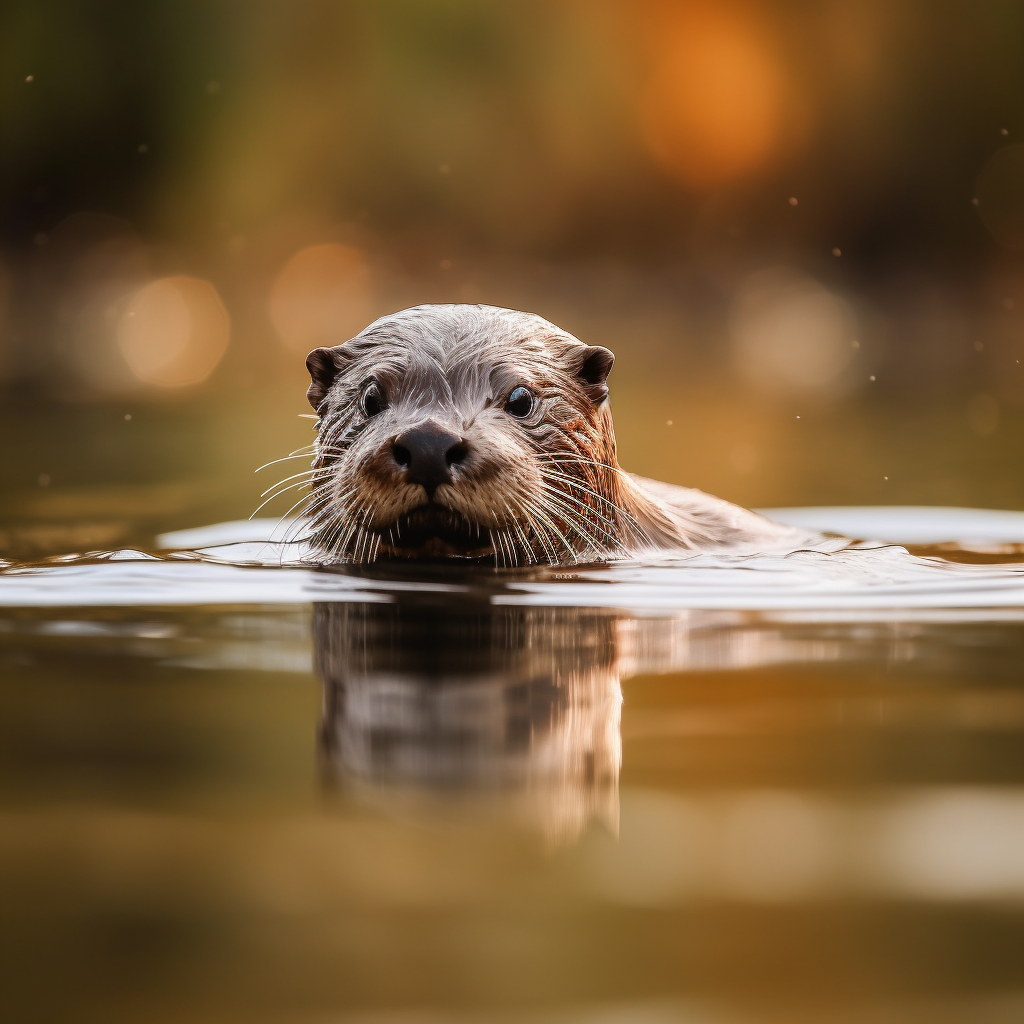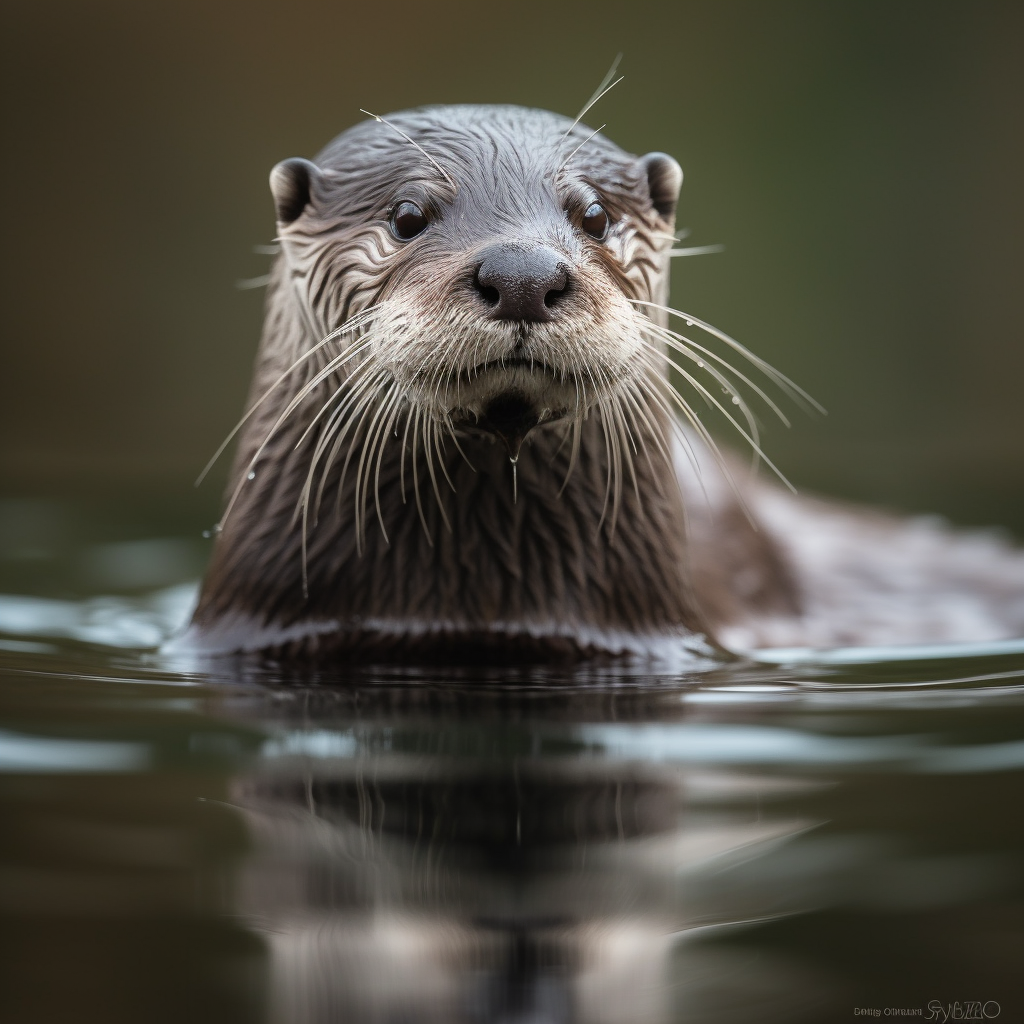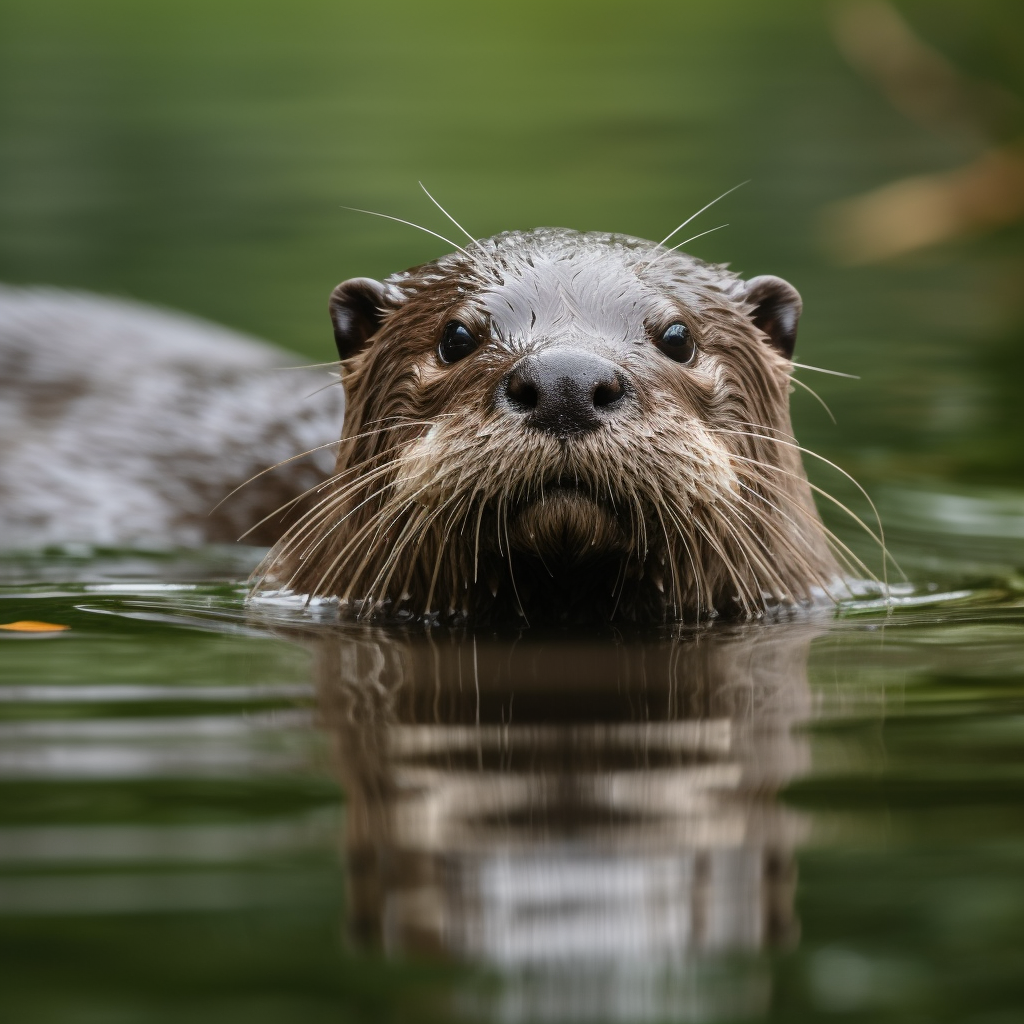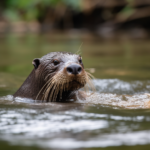River otters are fascinating creatures that inhabit freshwater ecosystems across North America. Known for their playful nature and sleek appearance, these semi-aquatic mammals have captured the hearts of many wildlife enthusiasts. However, there is a lingering question in the minds of some people: do river otters pose a threat to humans? In this article, we will explore the behavior of river otters, their interactions with humans, and whether or not they are likely to attack. So, let’s dive in and uncover the truth about river otters and their relationship with humans.
Key Takeaways
- River otters are generally not aggressive towards humans and attacks are extremely rare.
- However, if threatened or cornered, river otters may defend themselves and bite.
- It is important to respect their space and observe them from a safe distance to avoid any potential conflicts.
Understanding River Otters: A Brief Overview
River otters are fascinating creatures that inhabit freshwater environments across North America. Known for their playful nature and sleek appearance, these semi-aquatic mammals have captured the interest of wildlife enthusiasts and nature lovers alike. In this section, we will explore the habitat and behavior of river otters, their diet, and their historical interactions with humans.
A. River Otters: Habitat and Behavior
River otters are primarily found in freshwater habitats such as rivers, streams, lakes, and wetlands. They are well adapted to both aquatic and terrestrial life, with their streamlined bodies, webbed feet, and dense fur that provides excellent insulation. These adaptations allow them to navigate through water with ease and maintain their body temperature in cold environments.
These social animals are known for their playful behavior, often engaging in sliding, diving, and chasing games. River otters are highly agile swimmers and can stay submerged for several minutes while hunting for food. They are also skilled at climbing and can move swiftly on land.
River otters establish territories along water bodies, marking them with scent to communicate their presence to other otters. They are primarily active during dawn and dusk, known as crepuscular activity, but can also be seen during the day or night.
B. The Diet of River Otters: What Do They Eat?
River otters are opportunistic carnivores with a diverse diet. They primarily feed on fish, such as trout, bass, and catfish, but they are also known to consume amphibians, crustaceans, small mammals, and birds. Their diet varies depending on the availability of prey in their habitat.
These skilled hunters use their sharp teeth and strong jaws to catch and consume their prey. River otters are known to be voracious eaters, consuming a significant portion of their body weight in a single day. They are excellent swimmers and can chase fish underwater, using their dexterous paws to capture their prey.
C. River Otters and Human Interaction: A Historical Perspective
Throughout history, river otters have had limited interactions with humans. They generally avoid human presence and are more likely to retreat than confront. However, there have been rare instances where river otters have displayed aggressive behavior towards humans, particularly when they feel threatened or cornered.
It is important to note that river otter attacks on humans are extremely rare. These incidents are typically a result of human encroachment into their habitat or when otters are fed by humans, leading to habituation and loss of their natural fear of humans.
To minimize the potential for conflict, it is crucial to respect the natural behavior and habitat of river otters. Avoid approaching or cornering them, especially if they are with their young. Feeding or attempting to interact with wild otters is strongly discouraged, as it can disrupt their natural foraging patterns and lead to aggressive behavior.
In conclusion, while river otters are generally not a threat to humans, it is important to exercise caution and respect their natural behavior. By understanding their habitat, behavior, and diet, we can coexist with these fascinating creatures and appreciate their role in maintaining the balance of freshwater ecosystems.
Do River Otters Attack Humans?
A. Instances of River Otters Attacking Humans: A Reality Check
When it comes to interactions between humans and wildlife, it’s natural to wonder about the potential dangers involved. River otters, known for their playful and curious nature, are no exception. While river otters generally avoid confrontations with humans, there have been instances where these creatures have displayed aggressive behavior towards people.
It’s important to note that such incidents are relatively rare. River otters, like any wild animal, primarily seek to avoid human contact. However, understanding the circumstances surrounding these attacks can help us better comprehend the risks involved and take necessary precautions.
To gain a clearer perspective, let’s explore some documented cases of river otters attacking humans:
-
Case 1: In 2019, a kayaker in California reported being bitten by a river otter while paddling down a river. The otter, seemingly territorial, approached the kayaker and delivered a bite before retreating.
-
Case 2: In 2017, a fisherman in Oregon encountered an aggressive river otter while fishing near its den. The otter lunged at the fisherman, causing minor injuries before he managed to scare it away.
While these incidents may sound alarming, it’s important to remember that they are isolated occurrences. The vast majority of interactions between humans and river otters are peaceful and uneventful.
B. The Circumstances Leading to River Otters Attacking Humans
To understand why river otters may exhibit aggression towards humans, it’s crucial to consider the circumstances that can provoke such behavior. Here are some factors that can contribute to river otter attacks:
-
Territoriality: River otters are territorial creatures, especially during breeding and nesting seasons. If humans unknowingly intrude upon their territory, otters may perceive them as a threat and act defensively.
-
Protecting Young: Like many other animals, river otters fiercely protect their young. If humans inadvertently approach otter pups or their den, the parent otters may become aggressive to safeguard their offspring.
-
Food Competition: River otters rely on aquatic environments for their food sources, such as fish and crustaceans. In areas with limited resources, conflicts may arise if humans are perceived as competitors for these food sources.
-
Surprise Encounters: River otters are naturally curious animals and may approach humans out of curiosity. However, if startled or cornered, they may react defensively, potentially leading to an aggressive encounter.
Understanding these circumstances can help us minimize the risk of otter attacks and coexist harmoniously with these fascinating creatures.
C. Understanding the Aggression: Is It Defensive or Offensive?
When river otters display aggression towards humans, it’s essential to determine whether their behavior is defensive or offensive. In most cases, otter aggression is defensive in nature, driven by a desire to protect themselves, their young, or their territory.
Defensive aggression typically involves warning behaviors, such as hissing, growling, or posturing, to communicate their discomfort or desire for distance. If these warnings are ignored, otters may resort to more aggressive actions, such as biting or lunging.
It’s crucial to respect the boundaries of these wild animals and give them the space they need. Avoid approaching otters too closely, especially if they display signs of agitation or discomfort. By maintaining a safe distance and observing these creatures from afar, we can reduce the likelihood of conflicts and ensure the safety of both humans and river otters.
In the next section, we will explore practical tips and precautions to consider when encountering river otters in the wild, promoting a peaceful coexistence between humans and these remarkable creatures.
Do Otters Attack Humans: A Comparative Study

A. Sea Otters vs River Otters: Differences in Human Interaction
When it comes to interactions between otters and humans, it’s important to distinguish between sea otters and river otters. While both species belong to the same family, they have distinct behaviors and habitats that influence their interactions with humans.
Sea Otters
Sea otters primarily inhabit coastal areas, including the Pacific Ocean. They are known for their playful nature and are often seen floating on their backs, using rocks to crack open shellfish. Sea otters are generally not aggressive towards humans and tend to avoid direct contact. However, there have been rare instances where sea otters have bitten or scratched humans, usually in defense or when they feel threatened.
It’s important to note that sea otters are a protected species, and it is illegal to approach, touch, or disturb them in any way. This is not only for the safety of humans but also to protect the well-being of these vulnerable creatures.
River Otters
River otters, on the other hand, are more commonly found in freshwater environments such as rivers, lakes, and marshes. They are highly adaptable and can be found in various regions across North America. River otters are generally more elusive than sea otters and tend to avoid human contact.
While river otters are not typically aggressive towards humans, there have been rare cases where they have acted defensively or displayed territorial behavior. These incidents are usually a result of humans encroaching on their habitat or provoking them in some way.
B. The Role of Environment in Otter-Human Conflicts
The environment plays a significant role in otter-human conflicts. Human activities that encroach upon otter habitats can lead to increased interactions and potential conflicts. For example, urban development near water bodies can disrupt otter habitats and force them to seek alternative food sources or territory.
In areas where otters have become accustomed to human presence, such as popular tourist destinations or areas with high fishing activity, there may be a higher likelihood of otter-human interactions. This is because otters may associate humans with a potential food source or may become habituated to human presence.
It’s important for humans to respect otter habitats and maintain a safe distance. Observing otters from a distance and avoiding any attempts to feed or touch them is crucial for both human safety and the well-being of the otters.
C. The Influence of Human Activities on Otter Behavior
Human activities can have a significant impact on otter behavior. Pollution, habitat destruction, and overfishing can disrupt the natural balance of ecosystems, affecting otter populations and their behavior.
For example, pollution can contaminate water bodies, reducing the availability of prey for otters. This can lead to increased competition for food and potentially more aggressive behavior. Similarly, habitat destruction can force otters into smaller territories, increasing the likelihood of encounters with humans.
Conservation efforts and responsible environmental practices are essential in minimizing negative interactions between otters and humans. By preserving otter habitats and promoting sustainable fishing practices, we can help maintain a harmonious coexistence between humans and otters.
In conclusion, while otter attacks on humans are rare, it is important to understand the differences between sea otters and river otters, as well as the role of the environment and human activities in otter-human conflicts. By respecting otter habitats, maintaining a safe distance, and promoting conservation efforts, we can ensure the safety of both humans and otters in their natural environments.
Will River Otters Attack Humans: Predicting the Possibilities

River otters are fascinating creatures that inhabit freshwater ecosystems across North America. While they are generally known for their playful and curious nature, there have been instances where river otters have displayed aggression towards humans. In this section, we will explore the factors that might trigger river otters to attack humans, the role of human behavior in provoking otter attacks, and preventive measures to avoid such encounters.
A. Factors That Might Trigger River Otters to Attack Humans
River otters are territorial animals, and they may become aggressive if they feel threatened or if their habitat is disturbed. Here are some factors that might trigger river otters to attack humans:
-
Protecting their young: Like many other animals, river otters are fiercely protective of their offspring. If a human unknowingly approaches an otter’s den or gets too close to their young, the otter may perceive it as a threat and react aggressively.
-
Feeling cornered or trapped: River otters are highly agile in water, but on land, they may feel vulnerable and try to defend themselves if they are cornered or trapped. It’s important to give them space and avoid blocking their escape routes.
-
Food competition: River otters are skilled hunters and rely on fish, amphibians, and crustaceans as their primary food sources. If humans inadvertently interfere with their hunting grounds or try to take away their prey, otters may exhibit defensive behavior.
-
Unusual behavior or illness: In rare cases, river otters may display aggressive behavior due to illness or injury. If an otter is behaving abnormally, it’s best to keep a safe distance and report the sighting to local wildlife authorities.
B. The Role of Human Behavior in Provoking Otter Attacks
While river otters generally prefer to avoid human contact, certain human behaviors can inadvertently provoke otter attacks. It’s important to be mindful of our actions to minimize the risk of such encounters. Here are some factors to consider:
-
Approaching too closely: River otters have a natural fear of humans, and if we approach them too closely, they may feel threatened and react defensively. It’s crucial to maintain a respectful distance and observe them from afar.
-
Feeding or attempting to touch otters: Feeding wild animals, including river otters, can disrupt their natural foraging habits and lead to dependency on humans. Additionally, attempting to touch or interact with otters can be dangerous for both parties involved.
-
Disturbing their habitat: River otters rely on clean and undisturbed aquatic environments for their survival. Human activities such as pollution, habitat destruction, and excessive noise can disrupt their natural behavior and potentially lead to defensive responses.
C. Preventive Measures to Avoid River Otter Attacks
To ensure our safety and the well-being of river otters, it’s important to take preventive measures when encountering them in the wild. Here are some guidelines to follow:
-
Maintain a safe distance: Always keep a safe distance from river otters and observe them from afar using binoculars or a camera with a zoom lens. This will minimize the risk of provoking defensive behavior.
-
Do not feed otters: Feeding wild animals can disrupt their natural behavior and create dependency. It’s essential to refrain from offering food to river otters or any other wildlife.
-
Respect their habitat: Avoid disturbing river otter habitats by not littering, polluting, or making excessive noise near their habitats. By respecting their environment, we can help ensure their continued presence in our ecosystems.
-
Report aggressive behavior: If you encounter an aggressive river otter or witness any unusual behavior, report it to local wildlife authorities. They can assess the situation and take appropriate action to ensure the safety of both humans and otters.
By understanding the factors that might trigger river otters to attack humans, recognizing the role of human behavior in provoking otter attacks, and following preventive measures, we can coexist peacefully with these remarkable creatures. Remember, it’s our responsibility to protect and preserve the natural habitats of river otters and other wildlife for future generations to enjoy.
Do Giant River Otters Attack Humans: A Closer Look

A. Giant River Otters: An Introduction and Their Behavior
Giant river otters, also known as Pteronura brasiliensis, are fascinating creatures that inhabit the rivers and streams of South America. These otters are the largest of their kind, measuring up to 6 feet in length and weighing around 70 pounds. With their sleek bodies, webbed feet, and sharp claws, they are well-adapted for life in the water.
Giant river otters are highly social animals, living in family groups known as “rafts.” These rafts typically consist of an alpha pair, their offspring, and sometimes other related otters. They are known for their playful nature, often engaging in activities such as sliding down muddy banks or chasing each other in the water.
B. Instances of Giant River Otters Attacking Humans
While giant river otters are generally not aggressive towards humans, there have been rare instances where they have displayed aggressive behavior. These incidents are usually a result of the otters feeling threatened or provoked.
One such incident occurred in 2012 in Brazil’s Pantanal region, where a fisherman was attacked by a group of otters while he was fishing. The otters, likely defending their territory or young, bit the fisherman several times, causing injuries that required medical attention. Instances like these are extremely rare and should not deter people from appreciating these magnificent creatures in their natural habitat.
C. The Role of Size and Aggression in Giant River Otter Attacks
The size and aggression of giant river otters play a significant role in their potential to attack humans. As the largest otter species, they possess powerful jaws and sharp teeth that can cause harm if they feel threatened. However, it’s important to note that these attacks are uncommon and usually occur when humans intrude upon their territory or disturb their young.
To minimize the risk of otter attacks, it is crucial to respect their space and observe them from a safe distance. Avoid approaching otters too closely, especially if they are exhibiting signs of aggression such as growling or hissing. Additionally, it is advisable to refrain from feeding or interacting with wild otters, as this can disrupt their natural behavior and potentially lead to aggressive encounters.
In conclusion, while giant river otters do have the capability to attack humans, such incidents are rare and typically occur when the otters feel threatened or provoked. By understanding their behavior and taking necessary precautions, we can coexist with these magnificent creatures and appreciate them from a safe distance.
River Otter Attacks on Humans: The Aftermath
A. The Impact of Otter Attacks on Human Victims
When it comes to encounters between humans and wildlife, it’s essential to consider the potential impact on both parties involved. River otter attacks on humans, although rare, can have significant consequences for the victims. While river otters are generally not aggressive towards humans, there have been a few documented cases of otter bites and attacks.
The aftermath of an otter attack can vary depending on the severity of the incident. In most cases, otter bites may result in puncture wounds or scratches, which can lead to infections if not properly treated. Victims may experience pain, swelling, and potential scarring as a result of the attack.
It is crucial for individuals who have been attacked by a river otter to seek medical attention promptly. Healthcare professionals can assess the extent of the injuries and provide appropriate treatment, including cleaning and disinfecting the wounds, administering tetanus shots, and prescribing antibiotics if necessary.
Apart from the physical impact, otter attacks can also have psychological effects on the victims. Being attacked by any animal can be a traumatic experience, leading to fear, anxiety, and a reluctance to engage with wildlife in the future. It is important for victims to seek emotional support and counseling to address any lingering psychological distress.
B. The Ecological Consequences of Otter Attacks
While otter attacks on humans are relatively uncommon, it is essential to consider the ecological consequences of such incidents. River otters play a vital role in maintaining the balance of aquatic ecosystems. They are skilled hunters, primarily feeding on fish, amphibians, and crustaceans.
In instances where otters become habituated to human presence or associate humans with a source of food, their natural behavior can be altered. This can lead to increased interactions between otters and humans, potentially resulting in more frequent encounters and a higher risk of otter attacks.
Furthermore, negative interactions between humans and otters may lead to a perception of otters as a threat, which could result in retaliatory actions against these animals. This can disrupt the natural population dynamics of otters and have a cascading effect on the entire ecosystem.
To prevent such ecological consequences, it is crucial to promote responsible behavior around otters. This includes refraining from feeding or approaching otters in the wild, respecting their natural habitat, and ensuring proper waste management to avoid attracting otters to human-populated areas.
C. The Influence of Media Coverage on Public Perception of Otters
Media coverage plays a significant role in shaping public perception and attitudes towards wildlife, including river otters. When otter attacks on humans occur, they often receive widespread attention, leading to sensationalized narratives and misconceptions about otter behavior.
Media outlets may focus on rare instances of otter aggression, creating a skewed perception that otters are inherently dangerous or prone to attacking humans. This can lead to unnecessary fear and negative attitudes towards otters, potentially resulting in misguided actions such as attempts to eradicate or relocate otter populations.
It is important for media organizations to provide accurate and balanced reporting when covering otter attacks. By highlighting the rarity of such incidents and emphasizing the importance of coexistence with wildlife, media coverage can help foster a better understanding of otter behavior and promote responsible interactions between humans and otters.
In conclusion, while river otter attacks on humans are rare, they can have significant consequences for both the victims and the ecological balance of aquatic ecosystems. By understanding the impact of otter attacks on human victims, considering the ecological consequences, and recognizing the influence of media coverage, we can work towards fostering a harmonious coexistence between humans and otters. Conclusion
In conclusion, while river otters are generally not aggressive towards humans, there have been rare instances where they have displayed defensive behavior or acted out of curiosity. It is important to remember that these incidents are extremely uncommon and should not deter people from enjoying the presence of these fascinating creatures in their natural habitats. River otters are an integral part of the ecosystem, and observing them from a safe distance can be a wonderful experience. By respecting their space and not approaching them too closely, we can coexist peacefully with these playful and charismatic animals.
Frequently Asked Questions
Do river otters attack humans?
While river otters are not typically aggressive towards humans, there have been isolated incidents where otters have attacked people, usually in defense or when they feel threatened. It’s important to maintain a respectful distance when observing these creatures in the wild.
Do otters attack humans?
Otters, in general, are not known to attack humans. However, like any wild animal, they can become aggressive if they feel threatened or cornered. It’s always best to observe wildlife from a safe distance and never attempt to feed or touch an otter.
Will river otters attack humans?
River otters are not naturally aggressive towards humans. However, if they feel threatened or cornered, they may resort to aggression as a defense mechanism. It’s important to give otters their space and respect their natural habitat.
Do giant river otters attack humans?
Giant river otters are a larger species of otter and while they are not typically aggressive towards humans, they can be if they feel threatened. As with all wildlife, it’s important to observe them from a safe distance and avoid any actions that may provoke them.
River otter attack humans?
River otters are not known to typically attack humans. However, there have been isolated incidents where otters have shown aggression towards people, usually when they feel threatened or cornered. It’s always best to observe wildlife from a safe distance.
What are some precautions to take during an otter encounter?
If you encounter an otter, maintain a safe distance, do not attempt to feed it, and avoid cornering or threatening the animal. If the otter appears aggressive, slowly back away while keeping an eye on the animal.
What are the potential dangers of wild otters?
While otters are not typically dangerous, they are wild animals and can bite or scratch if they feel threatened. Additionally, otters can carry diseases such as rabies that can be transmitted to humans through bites or scratches.
How can we prevent otter attacks?
Preventing otter attacks largely involves respecting their space and not provoking them. Do not attempt to feed or touch otters, and observe them from a safe distance. If an otter appears aggressive, back away slowly without turning your back on the animal.
What is the impact of human activities on otters?
Human activities such as habitat destruction, pollution, and overfishing can have a significant impact on otter populations. These activities can reduce their food sources and living spaces, leading to a decline in their populations.
What are some measures for otter conservation?
Otter conservation measures include protecting their habitats, reducing pollution, and implementing sustainable fishing practices. Additionally, public education about otters and their importance to the ecosystem can also contribute to their conservation.




